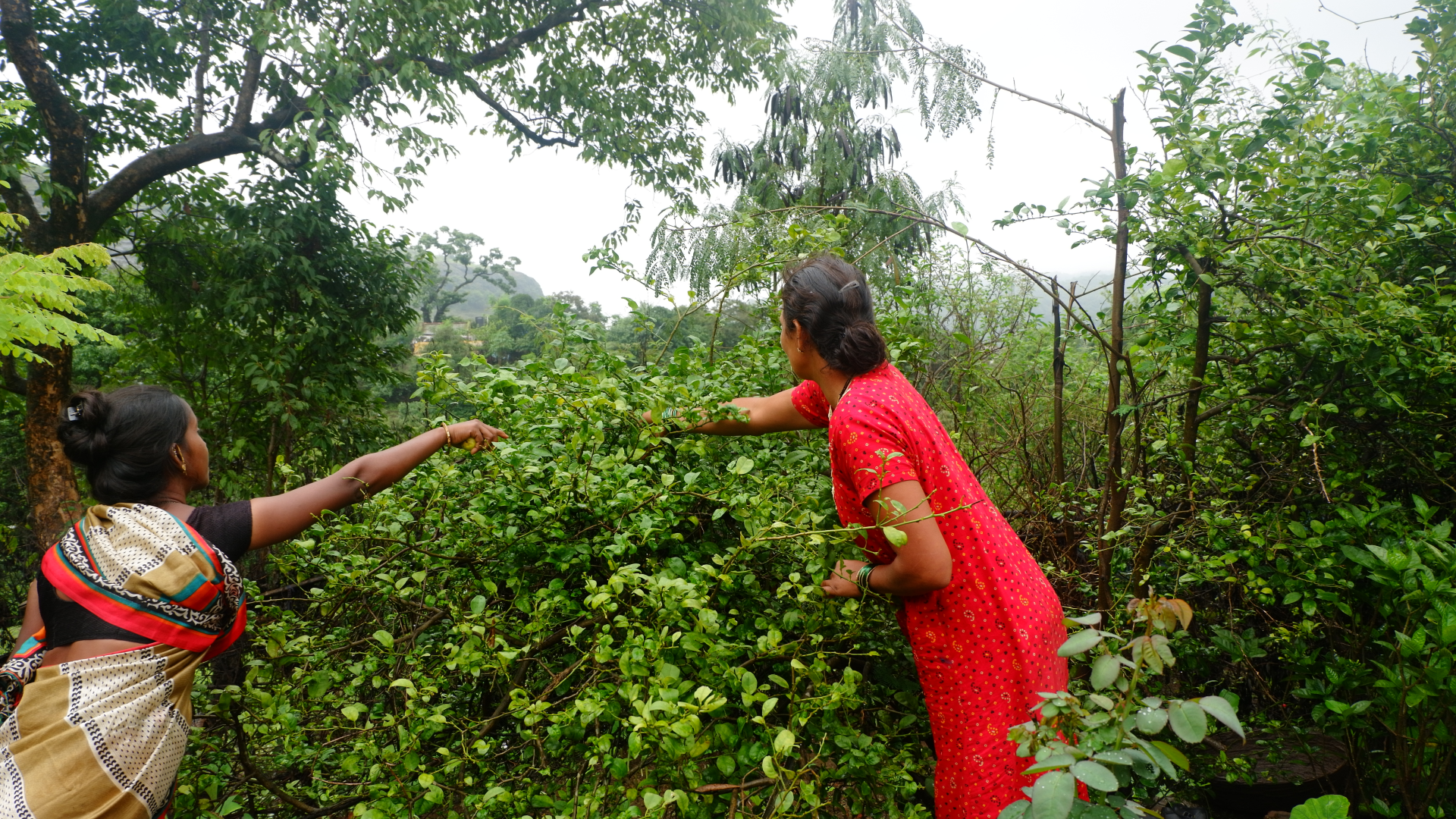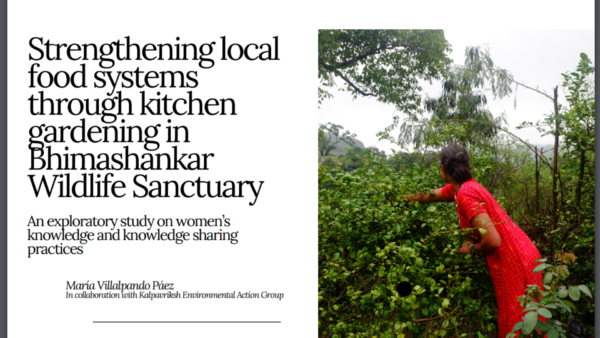A study on Adivasi women’s kitchen gardening in western India highlights women’s expertise and knowledge in household food production, transformation, and consumption. María Villalpando Páez led the study in collaboration with the Kalpavriksh Environmental Action Group (ICCA Consortium Member)
First published on 10/23/2022, and last updated on 11/08/2022
By María Villalpando Páez, in collaboration with Kalpavriksh Environmental Action Group (ICCA Consortium Member)
Located in the Western Indian state of Maharashtra, the Bhimashankar Wildlife Sanctuary (BWS) includes the territories of Adivasi [i] villages. Adivasi villages surround the sanctuary too. Women in these villages play a vital role in subsistence farming and wild food gathering practices. Adivasi women are crucial both in seed conservation and the use of forest produce.
A new exploratory study on Adivasi women’s kitchen gardening in this region highlights women’s expertise and knowledge in household food production, transformation, and consumption. María Villalpando Páez led the recently published study in collaboration with the Kalpavriksh Environmental Action Group (ICCA Consortium Member).
During the study, a participatory approach was taken to revalue women’s knowledge as a key to maintaining culturally and environmentally sound local food systems. This research points to how nutritional, culinary, and food-related knowledge is articulated through gender.
Download a brief version of the study (PDF File)
Gender has been widely used to analyze and understand the differences in males’ and females’ unequal access to the management and ownership of forest resources. However, little attention has been paid to women’s kitchen gardening practices and their role in nutrition and household food consumption. This study highlights women’s expertise and local food knowledge to bring it to light and re-assert it as crucial for the equitable and sustainable development of Adivasi communities.
Highlights
- Leveraging women’s knowledge and expertise in agriculture is necessary to provide women and men with equally accessible and safe environments to learn and share.
- Easily available and healthy food is why women feel proud and happy about growing and eating their food.
- The kitchen garden appears as a space for women to make their own decisions and put into practice their knowledge of vegetables and fruits for household consumption.
- Without romanticizing women’s socio-ecological practices, it is essential to recognize that nutritional, culinary, and food-related knowledge is articulated through gender.
- The methodology used for this study rejects the distinction between formal and informal knowledge and emphasizes the value of observation, flexibility, and adaptability in knowledge sharing and revaluation to allow women to gain confidence and recognition of their expertise.
In the region, Kalpavriksh Environmental Action Group [ii] has been promoting wild vegetable festivals and the informal dissemination of information about the nutritional and medicinal benefits of wild vegetables and local seed varieties. Furthermore, ten years of work with women’s self-help groups have proved successful in ensuring women have a safe space within their communities to gather, share and mobilize on different issues.
However, the use and consumption of local food varieties remain a challenge, along with household food self-sufficiency.
“Amhala pahije tenva amhi parasbaget jato ani laget te gheun yeto.” (“We go in the Kitchen Garden to collect whatever and whenever we want.”)
A common saying by women in the Adivasi villages
In BWS, gender has been widely used to understand the differences in agricultural households, from male and female unequal access to rural livelihoods to disparities over the management, allocation, and ownership of forest resources. Nevertheless, the boundary between the so-called productive and subsistence tasks is permeable for smallholder farming communities.
Little attention has been paid to gendered knowledge, that is, to specific experiences and practices. Adivasi women use to ensure household production of culturally and environmentally appropriate food. Although ongoing programs are gender-sensitive, how research and strategies learn about Adivasi women’s knowledge and notions of subsistence farming and conservation are not always approached through a gendered lens.
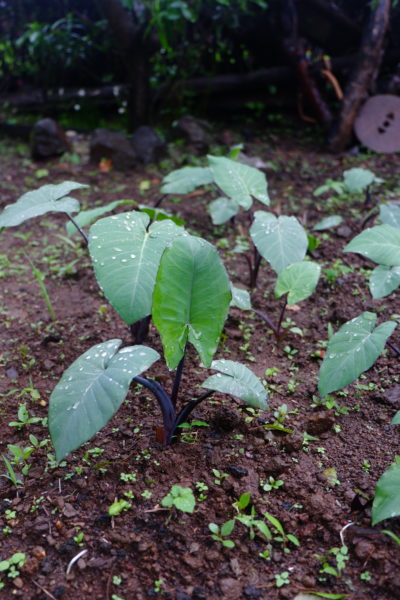
The favorite in the garden
Celosia is the favorite wild vegetable for women to grow in their kitchen garden and the reasons for liking this variety go from taste and nutrition to tradition. Women have had celosia in the household since childhood.
In other words, how we learn about what women know and how they share their practices often neglects their position within their household and community. The following considerations were taken in this exploratory study to contrast theory and practice and provide an analytical foundation for recognizing gendered knowledge in BWS Adivasi communities.
On gendered knowledge
Dominant notions of smallholder farming as a predominantly male-based activity (Deere, 1995) contribute to women being displaced from controlling and having access to natural resources and agricultural opportunities. Resources in smallholder farming systems are typically allocated based on power and status within the household, which is commonly male (Beuchelt, 2016), and power imbalances within households shape the way a farmer is defined, as well as how women’s contributions to agricultural production schemes are regarded.
Access to knowledge creation and sharing opportunities is inextricably linked to status and power within smallholder farmer communities. Little attention has gone to women’s uneven ability to access the same agricultural resources and opportunities as men or to agriculture education strategies to cater to women’s distinct needs. A production-oriented definition of a farmer excludes subsistence agriculture or production intended for household consumption, referred to as kitchen gardening, which women are commonly responsible for (Barbercheck, 2020). Therefore, a gendered understanding of knowledge and a careful analysis of women’s ability to access, create and disseminate their agricultural values and expertise are needed for equitable farming practices.
The gendered division of knowledge must be able to go beyond incorporating women and placing them at the forefront of farming practices and opportunities. The overarching objective of this approach is to understand and analyze the role of women as holders of kitchen gardening knowledge and practice, which is crucial for the social and physical reproduction of Adivasi communities.
On knowledge and sharing as catalyzers for food sovereignty
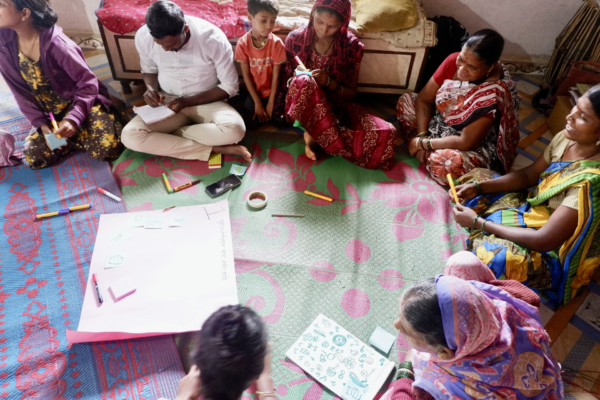
While the ‘knowledge is power’ analogy offers inspiration, it does not reflect Adivasi women’s efforts to access, absorb, and retain knowledge without being replaced or co-opted by other knowledge systems.
The possibility of egalitarian farming systems is directly related to women’s access to knowledge creation and sharing opportunities. Therefore, understanding the relationship between local agricultural knowledge, sharing practices, and knowledge generation are necessary for community engagement in the use and participation of locally and environmentally relevant subsistence farming practices.
Horizontal knowledge-sharing methods provide an opportunity to leverage women’s agricultural experience, best practices, and values. Drawing from cultural frameworks shared among women within the same community, this strategy is founded on a praxis-based model. Based on the notion that most household food-related issues have standard and local solutions, this approach is inherently linked to creating sustainable food systems, where knowledge is generated, shared, and transferred simultaneously.
In other words, women combine their own empirical experience with sharing practices. The transformative potential of this approach lies in its ability to meet the needs of specific contexts, farming systems, and farming conditions (Holt-Gimenez, 2006). Leveraging women’s knowledge and expertise in agriculture is necessary to provide women and men with equally accessible and safe environments to learn and share.
How the study was conducted
Women’s narratives are often not recorded nor accounted for. Traditional survey-based research methods and structured interviews cannot capture gender-based differences nor involve women in the co-creation of qualitative data.
The methodology used for this knowledge mapping exercise sought to ensure that while women were collectively sharing their current knowledge and knowledge-sharing practices, they were simultaneously able to reevaluate them. This knowledge mapping exercise is part of a collective envisioning of food alternatives that recognizes women’s specific knowledge of subsistence farming and food production activities.
Insights
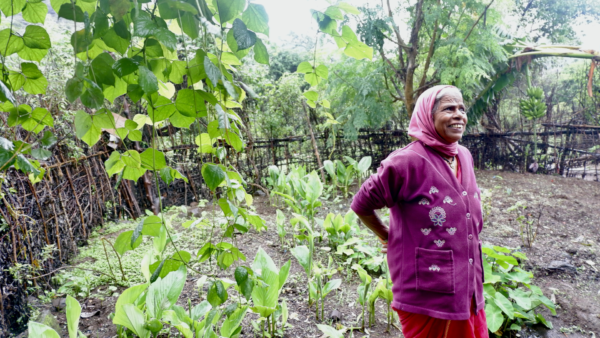
The kitchen garden is the primary go-to place for women to have readily available fruits and vegetables. When the yield is good from the kitchen garden, women do not need to travel long distances to the local market and spend money on production. Seed availability determines what is grown in the kitchen garden and informal seed exchanges are practices between women, relatives, and neighbors. While men take most decisions on what is grown in the agricultural field, decisions on what is grown in the kitchen garden are taken solely by women.
However, although men rarely participate in kitchen garden activities, women heavily support agricultural field work. This is particularly important to emphasize, given that kitchen gardening and rice transplanting activities overlap during the monsoon season. Additionally, and worth highlighting, is that women are responsible for fetching water, cooking, cleaning, and other household labor that often goes unacknowledged.
The kitchen garden appears as a space for women to make their own decisions and put into practice their knowledge of vegetables and fruits for household consumption. Knowledge-sharing practices also seem to be strictly female-led, as women mention learning about kitchen gardens from their mothers, grandmothers, mothers-in-law, or other women from their village.
Knowledge and best practices appear to be exchanged in informal ways, either by visits or word of mouth. It is worth highlighting that women appear to highly value seeing and experimenting with their own hands as a method for learning. For instance, the Chula – traditional wood fire stove – and bhanus – traditional kitchen spaces where spices and salt are kept – came up as areas where knowledge is transferred, alongside mentions of cooking and recipes as ways of learning about wild vegetables.
Without romanticizing women’s socio-ecological practices, it is essential to recognize that BWS’s nutritional, culinary, and food-related knowledge is articulated through gender. In small plots of land within families’ household boundaries, on slopes, and even on the fringes of their terrain, the Adivasi women have found resilient ways to grow their food. Their knowledge of kitchen gardening has been transferred from generation to generation of women, and the parallels of what and how they grew in their childhood and what they grow in their adulthood lead to think of their kitchen gardening practices as an intrinsically female tradition.
This ‘tradition’ is also the pillar for a household’s food self-sufficiency, even if to varying degrees – and the reason why Adivasi communities can grow and consume the local fruit and vegetable varieties they know and like the most. As they said: “Amhala pahije tenva amhi parasbaget jato ani laget te gheun yeto,” which in Marathi translates to “we go to the kitchen garden to collect whatever and whenever we want.”
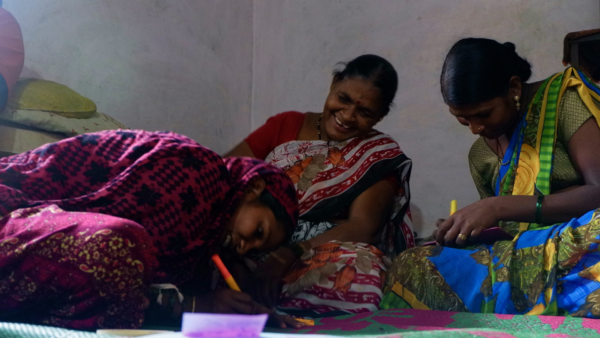
However, the tension between what is seen as productive agricultural practices and knowledge and ‘old’ or local knowledge primarily affects women. When women’s kitchen gardening experience and know-how are seen as merely an extension of their domestic chores, their agricultural practices are downgraded, leading to them lacking access to the resources and possibilities for sharing them.
This exploratory study worked under the assumption that participatory and visual research methods can be used as tools for local knowledge revaluation. The methodology rejects the distinction between formal and informal knowledge, emphasizes the value of observation, flexibility, and adaptability in knowledge sharing and revaluation, and seeks to allow women to gain confidence and recognition of their expertise. Beyond disclosing any information about kitchen gardening practices, focus groups were used as a tool for women to be aware of the value of food security and food sovereignty.
Women’s social position influences how knowledge is developed and determines whether others can readily transmit and adapt their experiences. In the face of climate uncertainty and food availability, horizontal and locally led exchange methods are necessary to enhance trust and build social networks. Moreover, practical and participatory knowledge-sharing practices are necessary to strengthen women-led spaces and for communities to revalue and recognize the work women are already doing in constructing food sovereignty.
References
Deere, C. (1995). What difference does gender make? Rethinking peasant studies. Feminist Economics, 1, 53–72. https://doi.org/10.1080/714042214
Beuchelt, T. (2016). Gender, social equity and innovations in smallholder farming systems: Pitfalls and pathways. In Technological and institutional innovations for marginalized smallholders in agricultural development (pp. 181–198). Springer.
Trauger, A., Sachs, C., Barbercheck, M., Kiernan, N. E., Brasier, K., & Findeis, J. (2008). Agricultural education: Gender identity and knowledge exchange. Journal of Rural Studies, 24(4), 432–439. https://doi.org/10.1016/j.jrurstud.2008.03.007
Holt-Gimenez, E. (2006). Campesino a Campesino: Voices from Latin America’s Farmer to Farmer Movement for Sustainable Agriculture. Food First. https://foodfirst.org/publication/campesino-a-campesino-voices-from-latin-americas-farmer-to-farmer-movement-for-sustainable-agriculture/
Hassanein, N., & Kloppenburg Jr., J. R. (1995). Where the Grass Grows Again: Knowledge Exchange in the Sustainable Agriculture Movement1. Rural Sociology, 60(4), 721–740. https://doi.org/10.1111/j.1549-0831.1995.tb00603.x
Mehta, M. (1996). “Our lives are no different from that of our buffaloes” Agricultural change and gendered spaces in a central Himalayan valley. In Feminist Political Ecology: Global Issues and Local Experiences. Routledge
[i] Adivasi means first inhabitants and is the term used to describe India’s Indigenous groups. They are classified as Scheduled Tribes in the Constitution of India. The Government of India does not consider any specific groups as ‘Indigenous’ since it claims all citizens to be Indigenous. [ii] Kalpavriksh is an Indian non-profit organization working on environmental and social issues. Founded in 1979 with a campaign led by students to save Delhi’s Ridge Forest, this organization’s philosophy is rooted in the belief that a country can develop meaningfully only when ecological sustainability and social equity are guaranteed, and a sense of respect for and oneness with nature, and fellow humans is achieved.
